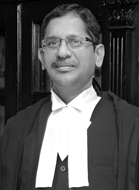Help needy, women, farmers, workers, disadvantaged, CJI to lawyers
Chief Justice of India (CJI) Justice N V Ramana today called upon lawyers to help the needy, women, farmers, workers and the disadvantaged to exercise their legal rights. “Whenever it is possible, extend free legal aid and educate people about their rights,” he said.
The Chief Justice was replying to a felicitation function organised by the Bar Council of India, on his appointment as the CJI.
He recalled how law was often seen as a rich man’s profession. “Access to the profession was limited to the rich and privileged. Slowly, the dynamics are changing within the profession. Due to change in social conditions, opportunities are opening up to all sections of the society, to be lawyers and judges.” He added that majority of aspirants from rural and vulnerable communities are not getting enrolled into the profession and that law still somehow remains an urban profession.
“This is because there are several obstacles which a young advocate must overcome. The harsh reality is that, without any patronisation, in spite of several years of waiting and struggle, no one can guarantee stability in the profession,” according to the CJI.

He stated that after 75 years of Independence, “One would expect at least 50 per cent representation for women at all levels, but I must admit, with great difficulty we have now achieved a mere 11 per cent representation of women on the bench of the Supreme Court. Some States, because of reservation policy may reveal higher representation, but the reality remains that the legal profession still has to welcome women into its fold.”
Justice Ramana said that majority of women advocates struggle within the profession. “Very few women find representation at the top. Even when they do, they still continue to face significant challenges,” he added.
The CJI also referred to the ‘corporatisation of the (legal) profession’, which he attributed to issues related to livelihood, leading ‘to many young and bright lawyers’ joining law firms. “This is a welcome change, as it is opening up fresh avenues for first generation lawyers. But at the same time, it is also causing a decline in the traditional practise. Common people cannot afford quality legal advice at corporate prices which is an area of concern.
“Even though we are strongly providing access to justice, still lakhs of people in India are unable to approach the Courts to seek remedy. The high expenditure and the long delay, which is a part of our legal process is the biggest challenge. Although this might not be the right occasion to mention, but as an experienced member of the judicial family, it is my duty to bring to your notice certain hard facts. The judicial system is facing difficult challenges like that of deficient infrastructure, shortage of administrative staff and huge vacancies of judges. I have been emphasising on augmenting the infrastructure for very long. I have a proposal to address this issue in a time bound manner. A comprehensive proposal for creation of National Judicial Infrastructure Corporation is under preparation. We have collected the status report from across the country. A proposal in this regard will reach the Hon’ble Law Minister very soon. I expect full cooperation from the Government,” Justice Ramana added.
He placed on record the role of “active and constructive partners” in the Collegium—Justices U U Lalit, A M Khanwilkar, D Y Chandrachud and L Nageswara Rao—in filling up the vacancies in the higher judiciary. “Due to the collective efforts, as you are all aware, we could reduce the number of vacancies in the Apex Court to just one. Similarly, after I took over, the Collegium has recommended, if I am not wrong, 82 names to various High Courts. I hope the Government will ensure that the names are cleared at the earliest just the way the nine names were cleared for the Apex Court. It is an ongoing process. We hope to live up to the herculean challenge of filling nearly 41 per cent vacancies existing in all the High Courts.”
The CJI praised lawyers describing them as mentors, guides, friends and philosophers and born leaders. “They should always remain active members of society, and solve the problems faced by the people. Take any people’s movements, lawyers have always been at the forefront. A lawyer needs to be an all-rounder and a versatile personality. He must be well versed about social issues and various fields like economics, history, politics, literature and others. Here, we must remember lawyers such as the legendary Nani Palkhivala, who despite never being an economist, used to address the public every year regarding the Budget.
“That is why, society gives a lot of respect to lawyers. It is your duty to keep up the confidence reposed in you by the public.”
Justice Ramana called upon the young members of the Bar to never forget the age old values of ‘this noble profession’. “Seniority has immense value in this profession. Give due regards to your seniors at the Bar for their experience, knowledge and wisdom. Respect women colleagues and treat them with dignity. Respect the institution and the judges. You are the frontline of the legal system and you must protect the institution from targeted, motivated and malafide attacks. It is inherent to the Bar that it speaks up for what is fair and just.”
On use of technology, he said that lawyers who cannot adapt to modern technology have been left behind. “Covid has led to the exclusion of one generation of talented lawyers. This disparity is not good for the nation or the profession,” he said.
